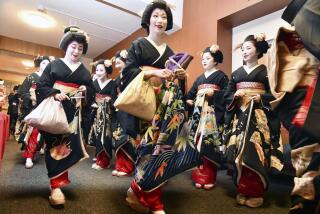Girls Who Offer Sex Upset Japan
TOKYO — Like many Japanese schoolgirls, Megumi, 16, covets Louis Vuitton bags, Chanel perfume and other de rigueur designer goods. And she’s found a fast way to acquire them: through sex with men three times her age.
The illicit trysts leave her open to blackmail, crank calls and sexually transmitted diseases. Yet she says they also bring a titillating break from boring schoolwork--and, at up to $1,000 per liaison, enable her to buy whatever goods she needs to assure her peer status.
“Girls in my school tend to be split up into the girls who have such things and girls who don’t,” Megumi explains matter-of-factly. “If you have the brand-name things, you’re important.”
The growing practice of older men meeting teenage girls for enjo kosai--”compensated dates”--has triggered a public outcry here. Alarmed parents and authorities say the rendezvous are leading to more teenage prostitution, although men also compensate girls for dining with them at restaurants, for instance, or sitting with them on a park bench holding hands.
The main target of the public wrath is a boom in the business of “telephone clubs,” in which girls can call men and decide after a conversation whether to meet them. The swift increase in such clubs has multiplied chances for men to find girls willing to accept “papas”--sugar daddies--experts say.
In the last few years, the number of clubs has rocketed to more than 2,200 across the country, and a recent national PTA survey indicated that as many as 25% of high school girls surveyed had called them at least once.
These discoveries have shocked Japan and led to anguished soul-searching over whether the nation’s “bubble” era of the late 1980s and early 1990s, when land and stock prices soared and consumption grew lavish, grossly distorted centuries-old cultural values.
“Before the bubble, more traditional Japanese virtues--how one is looked at in the community, for example--held more weight,” says Yukiko Hayami, a journalist who writes extensively about teenage culture. “But during the bubble . . . the media spread the idea that earning money was a good thing, no matter how you did it. As a result, these girls have absolutely no feeling that what they’re doing is bad.”
That men would want to lure young girls into sex is not considered particularly newsworthy here. A Lolita complex--older men desiring young girls--is well entrenched and reflected in such longtime pornographic standbys as sex videos featuring actresses in schoolgirl uniforms and adult comic books that include adolescent girls.
But Japan is agonizing over why increasing numbers of educated, middle-class girls are responding to the men--even taking the initiative by calling the clubs.
The girls who use the clubs are a distinct minority of Japanese teens, and those who have sex with the men they meet are an even smaller group. Most say that, like Megumi, they make the calls out of sheer boredom with school or a desire for easy spending money, says Shinji Miyadai, a Tokyo sociologist who has interviewed dozens of the girls.
Not all girls who make calls actually meet men. Kunise, 22, a college student from the southern area of Fukuoka, says she called the clubs a few times as a “joke” but would never go further. “I feel angry and ashamed toward the men who meet girls through the telephone clubs, although I sometimes wonder who is taking advantage of whom,” she says.
Keiko, a Tokyo high school student, says she tried to talk one of her best friends out of using the clubs, to no avail. “I’ve seen programs on TV about the telephone clubs, so I know they’re dangerous,” she says.
Moving Against Clubs
In recent months, police and other officials have moved against the clubs. The Ministry of Health and Welfare recently asked 165 juvenile welfare organizations for help in curbing the activity. Local governments are weighing the need for tougher laws against the clubs, newspapers are editorializing for stricter moral education, and church groups are appealing to teens with comic books that urge them to “just say no” to premarital sex.
In Tokyo, the metropolitan government is debating whether to make it illegal for adult men to have sex with girls under 18. Unlike the rest of the country, consensual sex with a minor is not a crime in Tokyo or in the nearby city of Nagano. Some oppose making such sex illegal here because of concern about privacy rights and worries that new laws would only highlight--and worsen--the problem. But others disagree.
“We must change the laws to prevent this problem,” says Akie Hatagawa of the group Stop Child Prostitution Action.
Telephone clubs, which first started appearing around 1985, work like this: Men pay around $20 to rent small rooms inside the clubs where they can relax, watch TV and wait for women to call in. The women call toll-free numbers advertised in public phone booths and on packets of tissues handed out on street corners.
The clubs began booming about four years ago with the introduction of prepaid telephone cards, which allowed men to be connected to women through any phone, not just those inside the clubs.
Some men want to do more than just talk. Nationwide in 1992, about 500 men were arrested for having sex with teenage girls they had met through telephone clubs. By 1995, that number had tripled.
Overall, 5,481 girls aged 18 and younger were questioned for involvement in prostitution--which is illegal in Japan--and other sex-related offenses in 1995, a 16% increase from the previous year, according to the National Police Agency.
School Principal Held
Recent headlines suggest that the problem of men engaging in sex with underage girls may be more widespread than statistics show.
In June, the principal of a major college preparatory school near Tokyo was arrested for running a prostitution ring involving 280 girls aged 14 to 17. In April, a Tokyo man was arrested for running an introduction service using 321 high school students.
“Teenage prostitution is becoming a big problem,” says Yusuke Sasaki, an official in the child and families bureau of the Health and Welfare Ministry. “And the telephone clubs have definitely had a huge influence on it.”
Shoko, a pretty 17-year-old high school student, is a case in point. She says she regularly meets for sex with about 10 men--all of whom she met through the telephone clubs.
“They look old enough to be my father. In fact, many are married and have kids who are around my age,” she says. Although she doesn’t enjoy their trysts, “It’s business,” she says.
Shoko and Megumi say they can earn between $300 and $1,000 for each sexual liaison. (Megumi says she sometimes has sex with handsome men for free.) Part-time jobs at convenience stores, fast-food restaurants or other typical employers of teens pay wages far too low to pay for the $500 designer bags and other high-priced goods they desire. The girls say they hide such purchases from their parents, or tell them they got them on sale.
“I feel sorry for the girls who spend all their free time slaving away at a normal part-time job,” Megumi says. “Once they finally make enough money to buy anything, they don’t have the time to show it off.”
Efforts to Understand
Many Japanese adults are desperately trying to understand the deeper causes of the phenomenon.
“The fact that we have reached the current situation is the fault of adults, not today’s young people,” Tamotsu Sengoku, director of the Japan Youth Research Institute, recently commented in the Mainichi Shimbun newspaper.
Some experts say that today’s parents are to blame. They remember their own strict upbringing and are reluctant to re-create that for their children because they don’t want to alienate them.
“Parents go out of their way to be friends with their children,” says Mariko Kuno Fujiwara, research director of the Hakuhodo Institute of Life & Living Inc. “They give up being a parent.”
Experts say looser parental discipline has also led teens to more drug abuse: The use of stimulants, marijuana and propane or butane for inhaling is on the rise, according to police statistics.
Fujiwara says teenage girls may also be influenced by the growing tolerance of sexual imagery in Japan over the last decade. Female nudity in magazines--including comic books read by teens--and films that would have led to police raids a few years ago are now routinely ignored by the authorities.
Japan’s popular culture, which has long promoted cuteness, now encourages sexiness with G-string fashions, push-up bras, miniskirts and frank talk about sex appearing in youth magazines.
Many parents, such as Chiyoko Ogawa, a 45-year-old homemaker in the Tokyo suburb of Chiba, have taken pains to talk to their daughters about the dangers of the clubs. Thanks to her mother’s talk, Nao Ogawa, 16, says she thinks “the clubs are dangerous and the men are gross” and she would never call one.
“I think the girls who call the clubs are stupid,” Nao’s mother says, referring to those who prostitute themselves. “They are not only jeopardizing their health, but doing something criminal.”
The girls themselves place the blame differently.
“I think the men who give us the money are bad,” Megumi says. “If there weren’t men like that, there wouldn’t be girls like us.”
The youth sex trade has precipitated a national backlash.
In one district of Tokyo, Masako Takashima of the local PTA is waging a campaign against pinku chirashi, pornographic leaflets that are regularly stuffed into mailboxes advertising everything from telephone clubs to sensual massages. Her group successfully drove out a club in their neighborhood.
In January, central Japan’s Gifu prefecture, or state, became the first place in the country to regulate telephone clubs by requiring them to register with authorities and banning them from locating near schools and libraries. Thirty-four other prefectures are also considering tougher measures. Kyoto prefecture will ban the clubs from all commercial and residential areas starting next month.
Christian groups are also riled. “The country is going to hell because the girls are going to hell,” says Kenny Joseph, a blustery evangelist in Tokyo who came to Japan from his native Chicago in 1951.
Joseph has recently taken up the fight against telephone clubs and loose morals with a weapon he’s sure will get teens’ attention: comic books. His congregation has just published 50,000 copies of “True Love Waits,” which urges Japanese teens to hold off on sex until they get married.
Clubs Fight Back
Telephone club operators seem ready for a fight. In Gifu, a group of them has filed a lawsuit against the local government, charging that the new measures are unconstitutional.
“If they’re only talking on the phone, even if they’re under 18, I really don’t think there’s anything really bad about it,” says Eiichi Shimohira of Shinjuku Soft, a company that runs a chain of telephone clubs.
But Shimohira says he’s not really worried about the new regulations. “If you ask whether prostitution will stop if telephone clubs disappear, I think girls will find more dangerous ways of doing it,” Shimohira says.
Indeed, girls are starting to post their snapshots, pager numbers and notes on message boards found in most video arcades here. “I want money,” the messages say. “I’m looking for a lover,” and “I’ll give you anything you want.”
More to Read
Sign up for Essential California
The most important California stories and recommendations in your inbox every morning.
You may occasionally receive promotional content from the Los Angeles Times.










